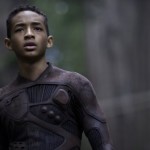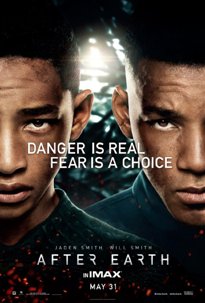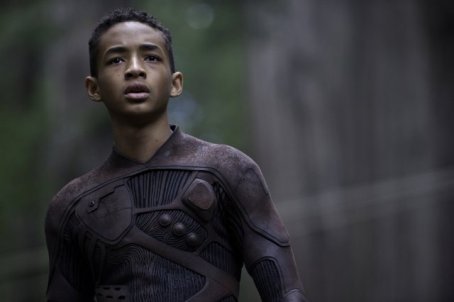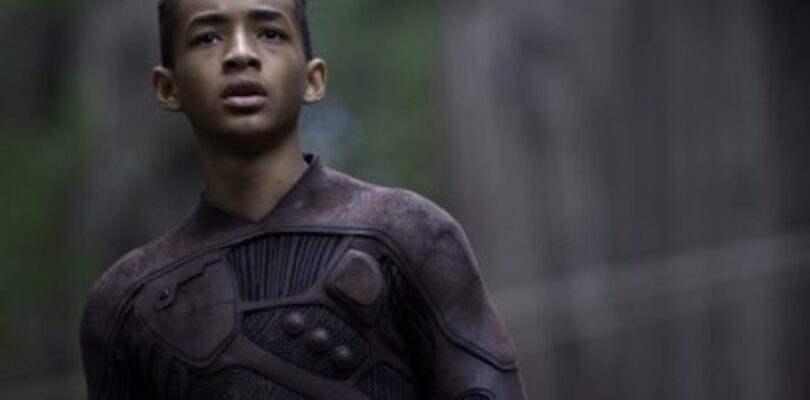
| Release Date: | May 31st, 2013 |
| Starring: | Jaden Smith, Will Smith, Isabelle Fuhrman, Sophie Okonedo, Zoe Kravitz, David Denman, Kristofer Hivju, Gabriel Caste, Lincoln Lewis, Chris Geere, Glenn Morshower |
| User Rating: | |
| Writer: | Gary Whitta, M. Night Shyamalan, Will Smith |
| MPAA Rating: | PG-13 |
| Director: | M. Night Shyamalan |
Original science-fiction is a rare thing in Hollywood today. With movie budgets climbing into the stratosphere and so much riding on every tent-pole release, studios are usually unwilling to take a risk on something that’s not based on a preexisting property. This summer, amid all the sequels and adaptations, there are a couple of original sci-fi films being released. The first of these is After Earth, a sci-fi adventure brought to us by Will Smith, Jaden Smith, and M. Night Shyamalan. But unfortunately for fans of original sci-fi, it’s really not good. After Earth is definitely not a horrible or unwatchable movie, but it takes a great concept and proceeds to waste it with an execution that never rises above so-so.

There are some interesting people in the cast, but this is really a two-man show between Will and Jaden Smith. I really like Will Smith as an actor, and I’ve enjoyed his work in previous summer movies like Independence Day (1996), Men in Black (1997), and even I, Robot (2004). And I admire that fact that he was willing to play a fairly unflattering role here, as the guy who spends almost the entire movie stuck in a cockpit with two broken legs, steadily growing weaker from blood loss. But speaking as a writer, I have to say that I want to slap whoever it was that thought the name “Cypher Raige” would work in any movie that isn’t a comedy; it sounds like the name of a character from one of those embarrassing 1990s comic books that was trying way too hard to be dark and edgy. Unfortunately, Will Smith is also responsible for my biggest problem with the cast – namely, the fact that Kitai Raige, the actual main character, is played by his son Jaden Smith. I’m sorry, but Jaden Smith just does not have the acting chops or charisma to carry a movie like this largely on his own. He handles himself well in the action scenes, but when he’s called upon to play more dramatic material, he just seems completely out of his depth. Sophie Okonedo, who plays Faia Raige, Cypher’s wife and Kitai’s mother, has a couple decent scenes with Smith. I actually thought that Zoë Kravitz did a good job with her small role of Senshi Raige, Kitai’s dead older sister; and personally, I would have liked the movie more if she had been the main character instead of Kitai. And the always-reliable Glenn Morshower shows up briefly as the commander in charge of Kitai’s training, which was a pleasant surprise for me.
[springboard type=”video” id=”726273″ player=”cnim002″ width=”560″ height=”315″ ]
Unless you’ve been following After Earth in the lead-up to its release, you may be unaware that it is co-written and directed by none other than M. Night Shyamalan. The Indian American filmmaker made his name with the well-received and financially successful The Sixth Sense (1999) and Unbreakable (2000), but his career has been on a steady downward spiral ever since. I was surprised when I first found out about Shyamalan doing this film, because after the last film he directed, the financially-disappointing and critically-reviled The Last Airbender (2010), I was amazed that any studio would actually let him near any project with a budget. This is actually the first Shyamalan film I’ve seen, and it pretty much confirmed the assessments of his talent that I’ve heard. He’s a decent enough director but he is not a good writer, with some of the lines here being truly groan-worthy, and his tendency to have his actors underplay things comes dangerously close to making them seem emotionless. Also, there were numerous instances where shots went on too long or lines were repeated unnecessarily. I have no training whatsoever in film editing, but in those moments, my mind was going “Cut, cut, cut already!” Ultimately, while this is far from his worst film, there are plenty of other directors and writers that I think could have done a better job on this than Shyamalan.
While the basic concept of the story is definitely interesting, the way that story is told leaves a lot to be desired. The film opens with a voiceover from Kitai, rather clumsily dumping out a bunch of exposition for the audience. The lines which explain how the future technology is supposed to work involve far too much technobabble, putting me in the mind of a bad episode of Star Trek: The Next Generation. And that tech often doesn’t hold up when you apply outside logic to it. For example, the primary weapon used by Cypher and Kitai is a “cutlass,” a bladed weapon that can shift between numerous different forms like a Swiss Army knife, but not one of those modes involves firing a projectile, making it useless outside close combat. The suits that the Rangers use are made of a “smart fabric” that changes its color and abilities in response to the surrounding environment, which is a cool idea, but the suits don’t come with gloves or any sort of head protection, which just seems ridiculous. Also, part of the peril in Kitai’s journey comes from the fact that the planet freezes over every night, forcing him to reach a geothermal hot spot before dusk; I shouldn’t have to say anything more to get across what a stupid notion this is. Without getting into spoilers, this nightly freezing leads to an incredibly dopey moment where Kitai is saved from death in a way that instantly reminded me of how Batman and Robin escaped the electromagnetic buoy in Batman (1966). More to the point, the fact that it’s only Kitai actually takes away from the tension, because we know that he’s not going to get killed; having a few more survivors who could have served as redshirts would have been a better idea. Finally, I have to rant about the moronic concept of “Ghosting” – the technique pioneered by Cypher Raige to help fight the Ursa, which involves purging your mind of all fear, which makes you invisible to the alien. There’s already a term for people who have no sense of fear – they’re called idiots, people who take unnecessary risks and get themselves and others hurt or killed. Despite what the movie tries to tell us, our fear response has been and will continue to be vital to our ability to survive. Ultimately, all that these things do is distract from what strengths the story does have. From what I’ve read, Will Smith’s original idea for what became After Earth was a real-world contemporary story about a father and son who are stranded in the mountains by a car crash, with the son having to go out and get help for his father. Frankly, I think that could have been a better and more interesting movie.

Jaden Smith in “After Earth.” © 2013 – Columbia Pictures.
The most consistently good elements of After Earth are its visuals and special effects, but even those leave something to be desired. Some of the outdoor environments, which were partially shot on location in Costa Rica, are truly breathtaking which make it a shame that they’re in such a lame movie. I had high hopes that at least the creatures in the film would be cool, but I definitely came away disappointed. Despite the animals having spent a thousand years without human interference, they’re really just modern animals that are a bit bigger and more aggressive. The filmmakers could have gotten away with virtually any sort of crazy mutation or evolution they wanted, and the fact that they didn’t do any of that strikes me as a massive wasted opportunity. The big problem I had with a lot of the CGI creatures here is the same problem I had with a lot of the stop-motion creatures in Ray Harryhausen’s Sinbad and the Eye of the Tiger (1977). Because the creatures are just real animals, as good as the animation is, the viewer is always aware they’re looking at an effect. And what about the Ursa, the vicious alien monster that stalks Kitai throughout his journey across Earth? It left me with the same feeling as so much of the rest of the movie. It’s basically your standard knock-off of the Xenomorphs from the Alien series, complete with the ability to spit corrosive fluid, albeit larger and with some extra limbs. It can also turn invisible, because why not also rip off Predator while you’re at it? And the Ursa shares that annoying tendency of so many movie monsters of being incredibly effective against minor characters, but is frustratingly unable to do so when it catches up to a lead actor.
Ultimately, my experience seeing After Earth ended up going much the way that I had imagined. I went in not expecting much from the movie, and that is exactly what I ended up getting. For me, After Earth is frustrating because you can see how it could have turned out so much better, rather than because it’s just out-and-out terrible. This is the kind of movie that I would recommend waiting until it’s on Blu-ray or Netflix to see if you’re interested. If you want to see a good sci-fi action film at the theater right now, I think you should check out Iron Man 3 or Star Trek Into Darkness instead. If you want to see an original sci-fi film at the theater this summer, save your money and wait for Pacific Rim and Elysium. In the end, After Earth is definitely not a terrible movie, but it’s also not something that anyone should feel the need to rush out to see.[box_info]WHERE TO WATCH (powered by JustWatch)
[/box_info]

